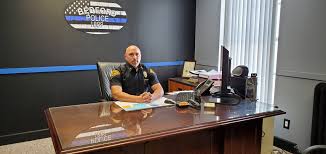
(UNDATED) – Local government, local law enforcement, and the Indiana State Police Department will enforce Governor Eric Holcomb’s stay-at-home order.

“I’d like to start off by saying we’re all going to be okay,” said Indiana State Police Superintendent Doug Carter. “We are asking for voluntary compliance for the Governor’s emergency order.”
Under the order, state and local law enforcement will work together to combat the spread of COVID-19.
Police officers will not randomly stop people.
“We’ll be looking for people egregiously violating the order by the Governor and if you are doing something so egregious you may be cited and/or arrested for violating the order,” said Carter.
Under the stay-at-home order issued by Governor Holcomb, people should only travel when necessary. This includes traveling to-and-from work at an essential business, picking up vital supplies, seeking medical care or for court-ordered travel.
Officers are taking precautions to stay healthy.
Bedford Police Chief Terry Moore hopes that individuals will follow the Governor’s order and do the right thing.

“We have no plans to stop vehicles or individuals out walking/riding bicycles and ask them where they are going,” says Chief Moore. “The list for what the Governor has designated as ‘essential’ is lengthy. Our officers have minimal personal protection equipment at this time and received training last week from the Lawrence County Health nurse on the proper way to use what we have. If a crime has been committed, we’re going to do what we have to do. We are continuing to serve the public to the best we can.”

“We will not stop a vehicle without a reason,” says Sheriff Mike Branham. “We still need a reason for a traffic stop they committed a traffic violation, suspicion of impaired driving and so on. If stopped we will ask if they are an essential employee and verify with ID, documentation, and/or phone calls to employers if necessary.”
A lot of changes have been implemented at the Lawrence County Jail.
“A screening tool supplied by our contracted inmate healthcare provider is being used for intake at booking, but also for staff coming in, including all having their temperature taken,” he added.
If an inmate displays symptoms, that inmate will be placed in quarantine until a court order is issued to release that inmate if they are a low-level, non-violent offender. Currently, there are no inmates in quarantine.
“We do have one staff member in self-quarantine due to possible exposure to a confirmed case, but they are not symptomatic,” said Sheriff Branham.
His name is not being released to protect his privacy.
Additional precautions:
- Quarantine areas were designated and a plan for expanding that if needed.
- The courts are conducting the majority of hearings via video court and continuing some hearings to reduce the number of inmates transported in and out of the facility.
- All staff are supplied with personnel protection equipment
- Disinfectant wipes and hand sanitizer have been provided, although the department is starting to run low on these supplies, as well as masks
- The staff has participated in training to deal with the epidemic
- All divisions are wiping down surfaces in their work areas before leaving at the end of their shift and are avoiding contact with incoming shifts.
- Operationally, officials have limited public access to the building and are conducting as much business by telephone, over the internet, or by appointment if necessary
- Deputies may not physically respond to non-emergent calls for service if they can be handled the incident over the telephone.
“While law enforcement officers have enormous powers afforded to them by our constitution and state statutes, we must and we will use discretion with any enforcement during this unprecedented time,” said Carter.
According to a post by Indiana State Trooper Sgt. Todd Ringle, those caught violating the order and who refuse to comply could be charged with a Class B Misdemeanor.

“We all are seeing that our citizens are afraid, are confused and are wondering about their future, just like us. This common-sense approach simply requires each Hoosier to do what you already know you should,” said Carter.
City and county officials also extended the local coronavirus emergency declaration to midnight on April 6th, which is the same date Governor Holcomb’s executive order is set to end.



